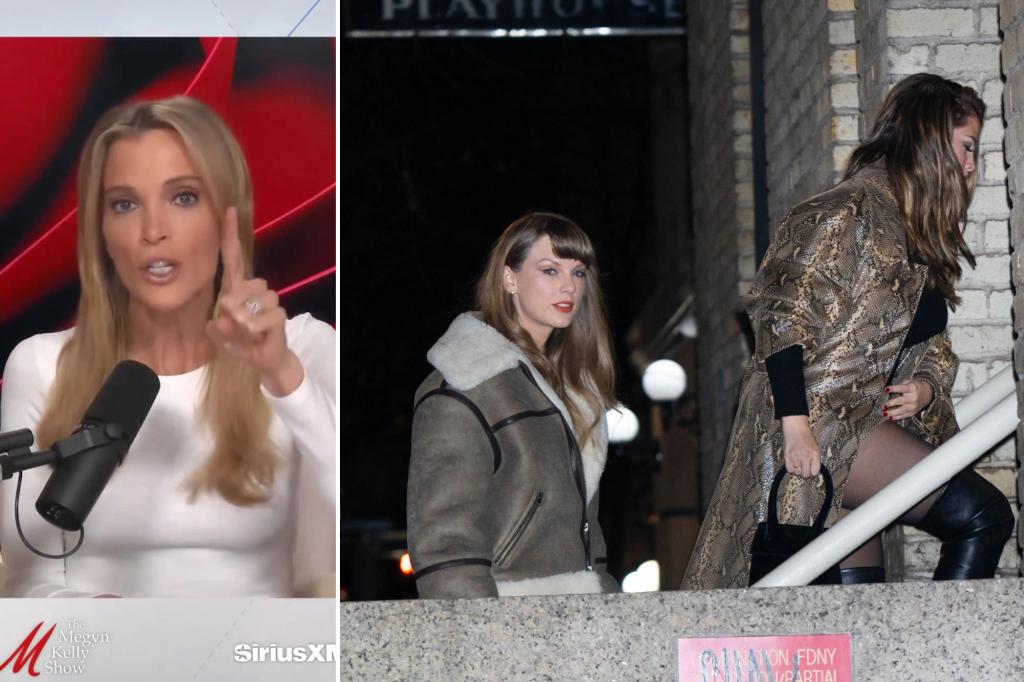In a seismic upheaval of the entertainment industry, Megyn Kelly, celebrated and forthright podcaster, sparked controversy by advocating for a comprehensive boycott of pop luminary Taylor Swift. The bone of contention burgeoned out from Swift’s presence at a fundraiser providing aid to Gaza’s inhabitants. Swift’s brandishing of her monumental status for this cause has led to widespread debate and dissent, unmistakably underscored by Kelly’s fierce call for boycott.
"Taylor Swift owes Israelis and Jewish Americans an apology… She clearly knows nothing." @MegynKelly slams Taylor Swift for attending a fundraiser in support of Gaza. Subscribe and watch the FULL show – https://t.co/3ouKFlSZuF pic.twitter.com/KGIdOULBNF
— The Megyn Kelly Show (@MegynKellyShow) December 12, 2023
Taylor Swift, distinguished as Time’s “Person of the Year” after her groundbreaking “Eras Tour” etched into history as the first to surpass the billion-dollar mark, was in attendance at stand-up comedian Ramy Youssef’s “More Feelings” tour at the Brooklyn Academy of Music last Friday. The event was dedicated to raising funds for American Near East Refugee Aid (ANERA), a non-governmental organization, amidst escalating tensions in the Gaza Strip post the deadly October 7 terrorist attacks.
Swift’s silent alignment with the cause faced immediate critique on Tuesday’s episode of “The Megyn Kelly Show,” where Kelly underlined Swift’s obligation to tender an apology to Israelis and Jewish Americans. Kelly stated emphatically, “I hope they boycott her events until she issues it because attending this thing was wrong.” She added her demand that Swift be held accountable for this “absurdity,” initiating a heated discourse on Swift’s decision.
Other attendees of the show included Selena Gomez, Anya Taylor-Joy, Zoë Kravitz, and Cara Delevingne, but it is Swift who currently occupies the vortex of this storm. The controversies surrounding ANERA, the beneficiary of the event’s proceeds, have fueled this fervor. Critics argue ANERA holds a biased perspective of the Israel-Palestine conflict, casting shadows of doubt over Swift’s alignment with the organization.
Since October 7th, Taylor Swift has made ZERO mentions of the massacre that occurred in Israel at the hands of Hamas terrorists.
Her own bodyguard, who is charged with protecting her life, went to Israel to serve in the IDF.
Swift did, however, make the time to attend a Gaza… pic.twitter.com/dEeDmuzc49
— StopAntisemitism (@StopAntisemites) December 11, 2023
Bootstrapping this critique, Kelly argued, “She’s a likable pop star, and I guess all I can say about that is I don’t turn to my pop stars for political wisdom. I wish they would shut up and sing.” The statement challenges the larger discourse around celebrities’ responsibilities and roles in sociopolitical scenarios, effectively spiraling a defensible wall around Swift’s engagement with the cause.
Despite the uproar, Swift’s robust contingent of fans and followers, fondly known as Swifties, defended her unflaggingly. One fan argued, “Taylor going to see a comedy show is not her actively supporting Gaza. this is Ramy actively supporting Gaza,” pointing to the root cause, which led to this broad-spectrum controversy. Swift’s publicist, Tree Paine, has currently maintained a silence on this matter.
As developments continue to unfold, tensions are unlikely to dissipate soon. Megyn Kelly’s call to boycott Taylor Swift is a glaring example of the intersection between entertainment and politics. While the discourse unravels, it deepens the divides and amplifies the echo chambers in our intellectual discourse. After all, swift judgment and resonating dissent are the beats to which modern controversies dance.
In a riveting conclusion, the international community must decipher the essence of and motivations behind celebrity involvement in humanitarian causes. Swift’s involvement in the fundraising event might seem benign, yet it evidently spiraled into a major controversy. With Youssef’s comedy tour slated to make rounds across France, Norway, Denmark, and Germany, the dialogue this controversy has initiated is far from over. As we reflect on this incident, it not only illuminates three-dimensional challenges at the intersection of global politics and humanitarian aid but also reignites debates on celebrities’ roles in conversation-starting on divisive issues.



